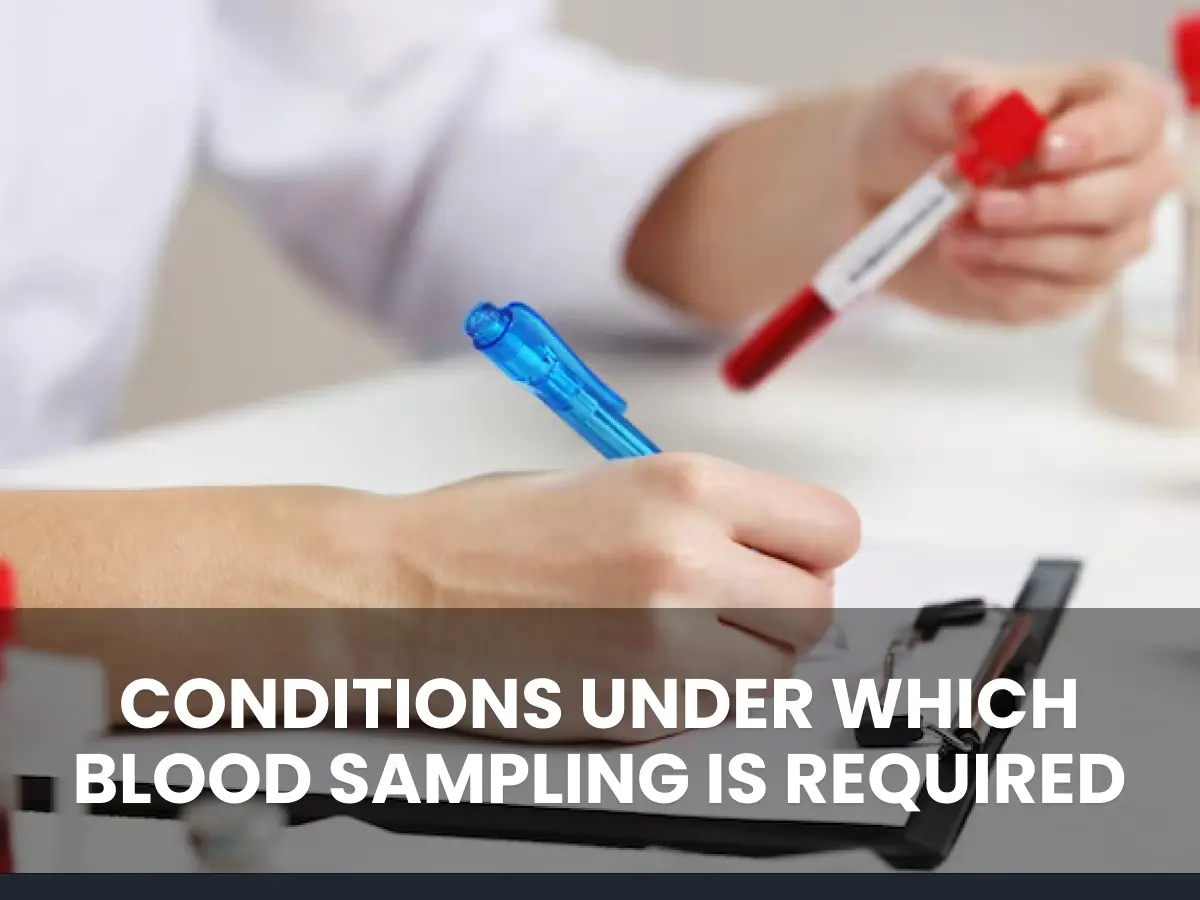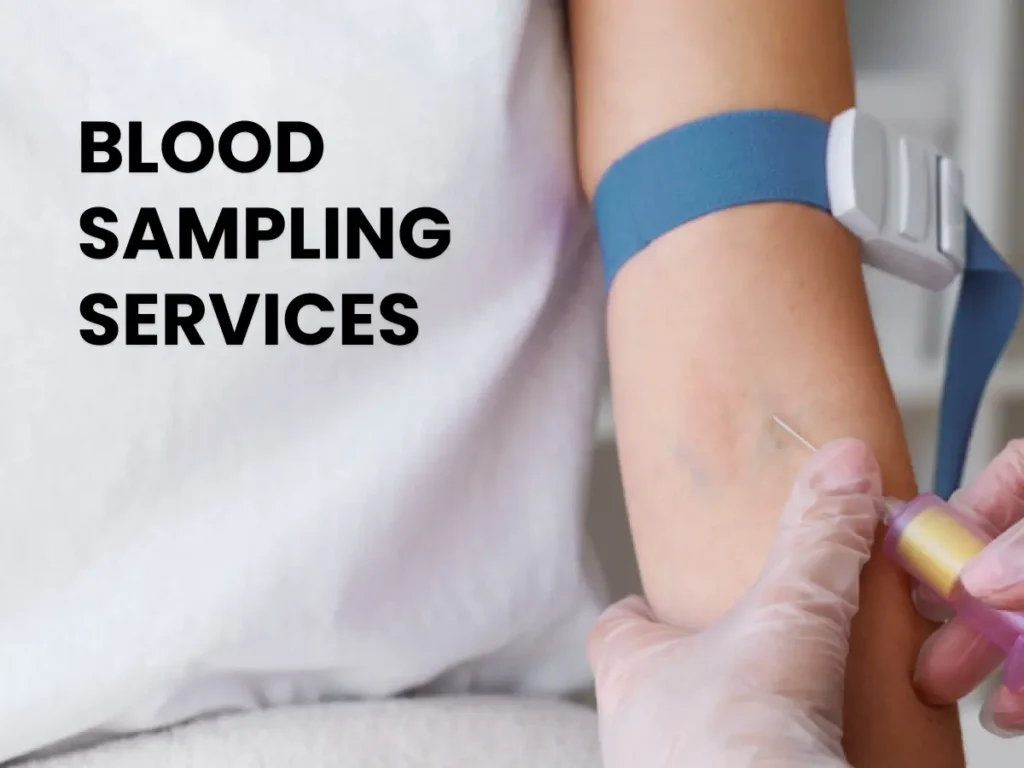In the early stages of health check-ups, many physicians recommend a blood test to examine various cells, chemicals, proteins and other substances in the patient’s body. It is conducted in laboratories to diagnose certain diseases and health issues. The blood sampling services monitor the overall health and medical condition of patients. This examination provides information about specific symptoms. In some cases of treatment, a blood test is taken to determine whether the treatment is effective or not. The blood sampling process has three effective methods.
- Venous blood sample: It is a deoxygenated blood sample drawn from the veins of the body. In it, the blood is obtained via venipuncture from the arm or forearm. This sample is used for wide-ranging analysis.
- Capillary Blood Sample: This sample consists of a mixture of arterial and venous blood and is collected by skin puncture on the fingertip or, in infants, from the heel. It is used for small samples or rapid testing.
- Arterial Blood Sample: This falls in the oxygenated category of the blood and is collected with an arterial puncture, usually in the wrist. This sample is used in the respiratory test or to assess oxygen levels in the body.
Mostly, blood sampling takes a few seconds and is conducted in doctors’ clinics, medical labs or diagnostic centres. A phlebotomist, nurse or doctor can collect the blood sample and the results of the medical laboratory test are available within a few hours or days, depending on the sample’s specifications.
Why are blood samples collected and what is their purpose?
A patient visits the doctor’s clinic or hospital with specific pain or unexplained symptoms for their illness. The doctor examines the patient and after a general check-up, sometimes recommends a blood test to assess their overall health. Blood samples are part of the routine examination, but are highly valuable in modern healthcare. With a small amount of blood, healthcare professionals gain insights into the patient’s health status. Blood sampling is a reliable method of diagnosis and helps in:
- Monitoring the function of different organs such as the liver, kidneys and heart.
- Tracking the effectiveness of medications or treatments for any disease.
- Identification of nutrient deficiencies, such as low iron, vitamin B12 or folate levels.
- Provides essential data before or after surgeries to help ensure the body functions properly.
- Helpful for routine health checkups and detection of serious problems.
- Plays a critical role in prenatal care by screening for conditions that could impact the mother or baby.
- Identifies risk factors for diseases like cancer, heart disease or blood disorders.
Blood sampling services are more than diagnosing any disease; they are also an important process for managing healthcare issues in the long term. Both doctors and patients need this blood evaluation for better health progress.
Conditions under which Blood Sampling is required
 Blood tests or blood samples are an important step to understanding a person’s health condition. In blood diagnosis, doctors examine various medical conditions such as high cholesterol, anaemia, infection, cancer, diabetes and heart health. Blood samples reveal how the body is functioning, including chemical levels and protein status. Doctors analyse the results and start treatment based on the patient’s condition.
Blood tests or blood samples are an important step to understanding a person’s health condition. In blood diagnosis, doctors examine various medical conditions such as high cholesterol, anaemia, infection, cancer, diabetes and heart health. Blood samples reveal how the body is functioning, including chemical levels and protein status. Doctors analyse the results and start treatment based on the patient’s condition.
Blood tests assist in overall health assessment and provide insights into chronic diseases, monitor organ functionality and inform about the immune system’s health. Regular blood testing is mandatory for the physically well and helpful in identifying the conditions mentioned below:
Heart Disease:
The heart is a more sensitive organ of the body that supplies blood to the whole body and if it experiences muscle damage or any other harm, it certainly affects the entire system. The release of certain proteins into the blood can impact the heart’s performance and blood tests can show how much the muscles are affected due to the release of these proteins.
Doctors recommend the cholesterol tester for a heart health checkup that provides insights about the fats in the blood and the risk to the heart. A blood test also evaluates the triglyceride level, which indicates the risk of heart disease.
Cancer:
Cancer is one of the dangerous diseases and diagnosing it requires many tests, including blood tests. Blood cancer needs specific blood tests, while other types of cancer can’t be identified with just blood tests. Blood tests reveal cancer-related proteins, cells or other signs. Here are two types of tests suggested by doctors for cancer suspicion:
- The blood test is about the number of blood cells; test results indicate the abnormality of the blood cells
- Protein testing detects abnormal immune system proteins that are often elevated in people with multiple myeloma.
Hepatitis C:
In the threat of Hepatitis, the blood test determines whether the person is infected with hepatitis C or not. The test is called the HCV, which indicates any virus of hepatitis C in the blood.
Blood Collection Procedure with Step-by-Step Instructions
Blood collection or blood sampling is a phlebotomy procedure performed by a phlebotomist to collect blood samples for testing and diagnosis. It is a step-by-step process that requires a complete set of guidelines, including planning, location, safety of patients and staff, equipment and proper training. Every step is crucial for patient cooperation. Your healthcare provider should recommend the healthcare facility and laboratory. Some steps mentioned below are necessary for blood collection.
- Preparation before starting the process.
- The area needs to be clean and sanitary.
- Quality control is a necessary step to prevent any infection.
- Safety care for both patients and healthcare workers.
Along with all these steps, other procedures are also involved, such as:
Availability of protective equipment & supplies:
One important aspect is the supply of equipment in the blood sampling services in Lebanon and it is the management’s responsibility to ensure the equipment supply is safe and reliable for patients. The equipment includes:
- Hygiene items like soap, water and alcohol rub.
- Fitted non-sterile gloves, disposable needles and a separate syringe for each patient.
- Sufficient laboratory sampling tubes to keep the sample safe.
Safety is everyone’s main focus, so many safety devices are available on the market to reduce blood waste and injuries. Management should keep each essential device.
Avoidance of equipment reuse:
Common medical devices such as tourniquets, finger-prick devices and glucometers pose a significant risk of transmitting infections like MRSA and hepatitis B due to poor hand hygiene by healthcare workers and the reuse of contaminated equipment. To prevent this in blood collection, all shared-use items must be visibly clean before patient contact and single-use items are not reused.
Trained Staff:
Phlebotomy is a sensitive matter, so staff should be trained to avoid the risk of blood wastage and infection in the patient. Every healthcare centre should train its staff for medical laboratory test services and laboratories should have professional and experienced phlebotomists to collect blood. Senior staff for the supervision of the phlebotomist is also essential.
Patient Cooperation:
Patient cooperation is essential for the success of the procedure and accurate results of the blood collection. Every laboratory has a written and clear information guide of the procedures provided to the patient to help them better understand the process.
Procedure of Blood Sampling:
- Collecting blood samples safely and accurately is a multi-step process. First, gather all necessary equipment, such as sample tubes, gloves, needles, a tourniquet and disinfectants, ensuring everything is easily accessible and visible on a tray, with the sample tube rack placed away from the patient to prevent accidental spills.
- In the second step, prepare the patient, introduce yourself and ask them to share their medical history and any allergies they might have. Guide the depressed patients and help calm them before starting.
- Then, select the most visible vein for puncturing based on the blood sample requirements.
- Before touching the patient, make sure the hygiene of your hands. Wash them and put on gloves that should be fitted and non-sterile.
- Clean the area where you need to collect blood with an alcohol swab, wiping from the centre outward and letting it dry completely to prevent contamination. Do not touch the cleaned area afterwards.
- When collecting blood, anchor the vein with your thumb below the site and ensure that the patient closes the fist. Insert the needle smoothly at a shallow angle. Once enough blood is collected, release the tourniquet before withdrawing the needle. Apply gentle pressure to the site with gauze and ask the patient to hold it with their arm extended, not bent.
At the end, you should have separate sample tubes to keep the blood and arrange those tubes in order on a rack. Do not apply any pressure to the tubes. Invert tubes with additives as specified by the lab before dispatch.
The Indispensable Role of Blood Sampling in Your Health Journey
Blood sampling plays a vital role in diagnosing and monitoring health conditions, involving careful, step-by-step procedures. A seemingly simple blood draw can reveal a wealth of information about your internal health, offering valuable insights into organ function, disease progression and treatment success. Whether it’s to confirm a diagnosis, track chronic conditions or take a proactive approach to wellness, professional blood test Lebanon is essential for empowering patients and healthcare providers with the knowledge needed to make informed health decisions.
Ultimately, blood sampling is more than just a medical procedure; it’s an essential tool for preventive care and disease management. By offering a clear snapshot of your physiological condition, regular and precise blood tests enable early detection of potential problems, allowing for timely interventions that can greatly improve health outcomes. As you manage your health, remember the significant role these services play in protecting your well-being, providing peace of mind through accurate diagnosis and careful monitoring right here in Lebanon.

